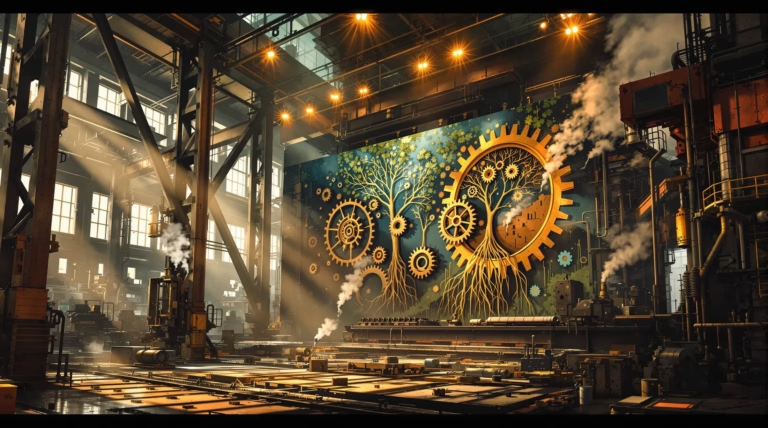Manufacturing Job Description: Key Responsibilities and Skills
Looking to understand the complexities of manufacturing job roles? Whether you’re an employer crafting job listings or a candidate seeking career opportunities in manufacturing, this comprehensive guide will help you navigate through essential responsibilities, required skills, and qualifications in the manufacturing sector.
Understanding the Manufacturing Job Description
Manufacturing job descriptions serve as detailed roadmaps outlining essential roles, responsibilities, and qualifications within the production industry. These documents provide crucial guidance for employers seeking qualified candidates and job seekers exploring position requirements. The scope and requirements vary significantly based on specific roles, industry sectors, and organizational size, from entry-level associates to senior management positions.
Overview of Manufacturing Roles
The manufacturing sector encompasses various specialized positions, each playing a vital role in the production process:
- Manufacturing Managers – oversee production processes, lead teams, schedule operations, and maintain quality standards
- Manufacturing Associates – handle frontline production tasks, operate machinery, and perform quality checks
- Manufacturing Engineers – focus on process optimization and equipment acquisition
- Quality Control Specialists – ensure product standards and compliance
- Production Planners – coordinate production schedules and resource allocation
- Maintenance Technicians – maintain and repair manufacturing equipment
Key Responsibilities in Manufacturing
Manufacturing professionals must handle diverse responsibilities crucial to successful production operations:
- Conducting rigorous quality testing and inspection procedures
- Implementing and following safety protocols
- Monitoring equipment performance and maintenance
- Maintaining accurate production records
- Participating in continuous improvement initiatives
- Coordinating with various departments
- Managing inventory and controlling costs
- Ensuring regulatory compliance
Essential Skills for Manufacturing Jobs
Success in modern manufacturing requires a combination of technical expertise and soft skills. Professionals must adapt to evolving technologies while maintaining fundamental competencies in production efficiency. Problem-solving abilities, leadership capabilities, and effective communication skills are essential for career advancement.
Technical Skills Required
| Skill Category | Required Competencies |
|---|---|
| Equipment Operation | Machine calibration, maintenance, troubleshooting |
| Software Proficiency | CAD, CAM, automation systems |
| Process Knowledge | CNC machining, injection molding, welding |
| Quality Control | Measurement techniques, testing protocols |
| Modern Manufacturing | Robotics, data analysis, predictive maintenance |
Educational Requirements
Educational prerequisites vary by position level and specialization:
- Entry-level positions – high school diploma or equivalent with on-the-job training
- Technical positions – specialized training through community colleges or apprenticeships
- Engineering roles – Bachelor’s degree in manufacturing, mechanical, or industrial engineering
- Management positions – Advanced degrees or professional certifications (CMfgE, Six Sigma, PMP)
Manufacturing Processes and Efficiency
Manufacturing processes form the backbone of production operations, transforming raw materials into finished products through strategic workflow design, technology implementation, and skilled labor. In today’s competitive landscape, manufacturers must continuously evaluate and refine these processes to maintain market advantage and profitability.
- Overall Equipment Effectiveness (OEE)
- Throughput rates optimization
- Cycle time reduction
- Cross-functional collaboration
- Systematic problem-solving methodologies
- Data-driven decision making
Improving Manufacturing Processes
A systematic approach to process improvement identifies bottlenecks, eliminates waste, and optimizes workflows through proven lean manufacturing principles. These methodologies focus on:
- Value stream mapping for workflow analysis
- 5S workplace organization implementation
- Kaizen events for continuous improvement
- Manufacturing simulation tools
- Advanced analytics integration
- Collaborative robotics deployment
- Automated guided vehicle implementation
Managing Production Costs
| Cost Category | Management Strategy |
|---|---|
| Raw Materials | Detailed cost analysis and supplier optimization |
| Labor | Workforce efficiency and skill development |
| Equipment | Preventive maintenance programs |
| Energy | Consumption reduction initiatives |
| Inventory | Just-in-time practices implementation |
Process optimization serves as a powerful lever for decreasing production costs while maintaining product quality. Through streamlined workflows, manufacturers can reduce cycle times and minimize material waste. These approaches collectively enhance manufacturing efficiency while driving down production costs—ultimately increasing profitability without compromising delivery schedules.
Compliance with Government Regulations
Manufacturing compliance encompasses technical, legal, and corporate requirements that manufacturers must adhere to throughout their production and marketing processes. These regulations ensure products meet safety standards, quality benchmarks, and legal requirements while protecting consumers and the environment.
- OSHA (Occupational Safety and Health Administration) – workplace safety standards
- FDA (Food and Drug Administration) – product safety and quality requirements
- EPA (Environmental Protection Agency) – environmental protection guidelines
- ISO Certifications – international quality management standards
- Industry-specific regulations and standards
| Compliance Component | Implementation Strategy |
|---|---|
| Documentation Systems | Digital record-keeping and automated reporting |
| Regular Audits | Scheduled internal and external compliance reviews |
| Employee Training | Ongoing education on regulatory requirements |
| Quality Control | Continuous monitoring and testing procedures |
| Risk Management | Proactive identification and mitigation strategies |
Understanding Regulatory Requirements
Manufacturing professionals must develop comprehensive knowledge of sector-specific regulations. This includes identifying applicable standards, determining compliance schedules, and maintaining proper documentation. For example, pharmaceutical manufacturers follow Current Good Manufacturing Practice (CGMP) regulations, while electronics manufacturers adhere to RoHS and WEEE directives.
- Enterprise Resource Planning (ERP) systems for compliance tracking
- Automated material usage monitoring
- Production process documentation
- Compliance report generation
- Regular regulatory updates and training
- Integration of compliance activities into daily operations







